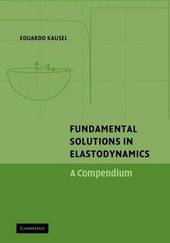
|
Fundamental Solutions in Elastodynamics: A Compendium
Paperback / softback
Main Details
| Title |
Fundamental Solutions in Elastodynamics: A Compendium
|
| Authors and Contributors |
By (author) Eduardo Kausel
|
| Physical Properties |
| Format:Paperback / softback | | Pages:262 | | Dimensions(mm): Height 254,Width 178 |
|
| Category/Genre | Building, carpentry and structural engineering |
|---|
| ISBN/Barcode |
9780521375993
|
| Classifications | Dewey:531.382 |
|---|
| Audience | | Professional & Vocational | |
|---|
| Illustrations |
Worked examples or Exercises
|
|
Publishing Details |
| Publisher |
Cambridge University Press
|
| Imprint |
Cambridge University Press
|
| Publication Date |
21 July 2011 |
| Publication Country |
United Kingdom
|
Description
This work is a compilation of fundamental solutions (or Green's functions) for classical or canonical problems in elastodynamics presented with a common format and notation. These formulas describe the displacements and stresses elicited by dynamic sources in solid elastic media like full spaces, half-spaces, strata and plates in both two and three dimensions, using the three major coordinate systems (Cartesian, cylindrical and spherical), and also for transient and harmonic motions. Such formulas are useful for numerical methods and practical application to problems of wave propagation in elasticity, soil dynamics, earthquake engineering, mechanical vibration, or geophysics. These formulas were heretofore only found scattered throughout the literature. The solutions are tabulated without proof, but giving reference to appropriate modern papers and books containing full derivations. Most formulas in the book have been programmed and tested within the MATLAB environment. The program listings are available for free download on the book's website.
Reviews'[This book] presents a concise treatment of fundamental solutions of a variety of problems arising in elastodynamics ... It should be useful to students and researchers in applied mathematics, geophysics, engineering and other applied sciences.' Fiazud Din Zaman, Zentralblatt MATH
|